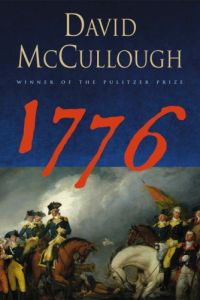
1776
First Edition: 2005 mais...
ISBN: 9780743226714
Pages: 400
Recommendation
The late historian David McCullough, twice a Pulitzer Prize winner, presents a deeply researched and brilliantly written narrative that holds the reader from start to finish. In one of his shortest books, McCullough focuses on the pivotal year of 1776, during which the new United States emerged and somehow survived. The heroes of his story are not in Philadelphia at the Continental Congress. They’re bleeding on miserable, frozen and disease-ridden battlefields in Boston, New York and New Jersey. Writing from the perspectives of George Washington and his troops, McCullough illuminates the sacrifices, heroism and fortitude they mustered to start an independent nation.
Summary
About the Author
The late David McCullough won Pulitzer Prizes for two biographies, Truman and John Adams. His other acclaimed histories include: Brave Companions: Portraits in History, The Pioneers: The Heroic Story of the Settlers Who Brought the American Ideal West; The Greater Journey: Americans in Paris; Mornings on Horseback: The Story of an Extraordinary Family, a Vanished Way of Life and the Unique Child Who Became Theodore Roosevelt, and more. McCullough also won a Presidential Medal of Freedom.








Comment on this summary